36 start with D start with D
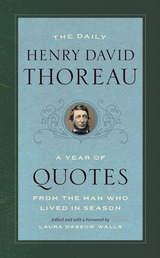
Modernity rules our lives by clock and calendar, dividing the stream of time into units and coordinating every passing moment with the universal globe. Henry David Thoreau subverted both clock and calendar, using them not to regulate time’s passing but to open up and explore its presence. This little volume thus embodies, in small compass, Thoreau’s own ambition to “live in season”—to turn with the living sundial of the world, and, by attuning ourselves to nature, to heal our modern sense of discontinuity with our surroundings.
Ralph Waldo Emerson noted with awe that from flowers alone, Thoreau could tell the calendar date within two days; children remembered long into adulthood how Thoreau showed them white waterlilies awakening not by the face of a clock but at the first touch of the sun. As Thoreau wrote in Walden, “Time is but the stream I go a-fishing in. I drink at it; but while I drink I see the sandy bottom and detect how shallow it is.”
Drawn from the full range of Thoreau’s journals and published writings, and arranged according to season, The Daily Henry David Thoreau allows us to discover the endless variation and surprise to be found in the repetitions of mundane cycles. Thoreau saw in the kernel of each day an earth enchanted, one he honed into sentences tuned with an artist’s eye and a musician’s ear. Thoreau’s world lives on in his writing so that we, too, may discover, even in a fallen world, a beauty worth defending.
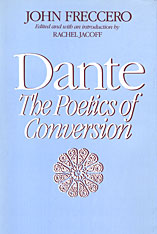
John Freccero enables us to see the Divine Comedy for the bold, poetic experiment that it is. Too many critics have domesticated Dante by separating his theology from his poetics. Freccero argues that to fail to see the convergence of the letter and the spirit, the pilgrim and the poet, is to fail to understand Dante’s poetics of conversion. For Dante, body and soul go together and there is no salvation that’s purely intellectual, no poetry that is simply literary.
The essays that form this book were originally published between 1959 and 1984. They are arranged to follow the order of the Comedy, and they form the perfect companion for a reader of the poem. With these essays assembled for the first time, we can now see Freccero’s stature: he is the best contemporary critic of Dante. Freccero is that rare article, a critic of eclectic and not dogmatic persuasion. Throughout Freccero operates on the fundamental premise that there is always an intricate and crucial dialectic at work between Dante the poet and Dante the pilgrim, and that it is this dialectic that makes the work so profoundly dramatic, one of the great novels of the self.
Thanks to Freccero we readers have the Comedy whole again. Freccero calls upon medieval philosophy, cosmology, science, theology, and poetics to enable us to traverse Dante’s moral landscape without losing our way in the confusions of minute exegeses. In a secular age Freccero enables us to see this poem as what it is, something wholly other than what we might believe or write. In doing so he shows us the most that language can achieve in any age, secular or not.

The first fruits of Greek botany.
Theophrastus of Eresus in Lesbos, born about 370 BC, is the author of the most important botanical works that have survived from classical antiquity. He was in turn student, collaborator, and successor of Aristotle. Like his predecessor he was interested in all aspects of human knowledge and experience, especially natural science. His writings on plants form a counterpart to Aristotle’s zoological works.
In the Enquiry into Plants Theophrastus classifies and describes varieties—covering trees, plants of particular regions, shrubs, herbaceous plants, and cereals; in the last of the nine books he focuses on plant juices and medicinal properties of herbs. This edition is in two volumes; the second contains two additional treatises, On Odours and Weather Signs.
In De causis plantarum Theophrastus turns to plant physiology. Books 1 and 2 are concerned with generation, sprouting, flowering and fruiting, and the effects of climate. In Books 3 and 4 Theophrastus studies cultivation and agricultural methods. In Books 5 and 6 he discusses plant breeding; diseases and other causes of death; and distinctive flavors and odors. The Loeb Classical Library edition is in three volumes.
Theophrastus’ celebrated Characters is of a quite different nature. This collection of descriptive sketches is the earliest known character-writing and a striking reflection of contemporary life.

The first fruits of Greek botany.
Theophrastus of Eresus in Lesbos, born about 370 BC, is the author of the most important botanical works that have survived from classical antiquity. He was in turn student, collaborator, and successor of Aristotle. Like his predecessor he was interested in all aspects of human knowledge and experience, especially natural science. His writings on plants form a counterpart to Aristotle’s zoological works.
In the Enquiry into Plants Theophrastus classifies and describes varieties—covering trees, plants of particular regions, shrubs, herbaceous plants, and cereals; in the last of the nine books he focuses on plant juices and medicinal properties of herbs. This edition is in two volumes; the second contains two additional treatises, On Odours and Weather Signs.
In De causis plantarum Theophrastus turns to plant physiology. Books 1 and 2 are concerned with generation, sprouting, flowering and fruiting, and the effects of climate. In Books 3 and 4 Theophrastus studies cultivation and agricultural methods. In Books 5 and 6 he discusses plant breeding; diseases and other causes of death; and distinctive flavors and odors. The Loeb Classical Library edition is in three volumes.
Theophrastus’ celebrated Characters is of a quite different nature. This collection of descriptive sketches is the earliest known character-writing and a striking reflection of contemporary life.

The first fruits of Greek botany.
Theophrastus of Eresus in Lesbos, born about 370 BC, is the author of the most important botanical works that have survived from classical antiquity. He was in turn student, collaborator, and successor of Aristotle. Like his predecessor he was interested in all aspects of human knowledge and experience, especially natural science. His writings on plants form a counterpart to Aristotle’s zoological works.
In the Enquiry into Plants Theophrastus classifies and describes varieties—covering trees, plants of particular regions, shrubs, herbaceous plants, and cereals; in the last of the nine books he focuses on plant juices and medicinal properties of herbs. This edition is in two volumes; the second contains two additional treatises, On Odours and Weather Signs.
In De causis plantarum Theophrastus turns to plant physiology. Books 1 and 2 are concerned with generation, sprouting, flowering and fruiting, and the effects of climate. In Books 3 and 4 Theophrastus studies cultivation and agricultural methods. In Books 5 and 6 he discusses plant breeding; diseases and other causes of death; and distinctive flavors and odors. The Loeb Classical Library edition is in three volumes.
Theophrastus’ celebrated Characters is of a quite different nature. This collection of descriptive sketches is the earliest known character-writing and a striking reflection of contemporary life.

There were heroic lives and deaths before and after, but none quite like Socrates'. He did not die by sword or spear, braving all to defend home and country, but as a condemned criminal, swallowing a painless dose of poison. And yet Socrates' death in 399 BCE has figured large in our world ever since, shaping how we think about heroism and celebrity, religion and family life, state control and individual freedom, the distance of intellectual life from daily activity--many of the key coordinates of Western culture. In this book Emily Wilson analyzes the enormous and enduring power the trial and death of Socrates has exerted over the Western imagination.
Beginning with the accounts of contemporaries like Aristophanes, Xenophon, and, above all, Plato, the book offers a comprehensive look at the death of Socrates as both a historical event and a controversial cultural ideal. Wilson shows how Socrates' death--more than his character, actions, or philosophical beliefs--has played an essential role in his story. She considers literary, philosophical, and artistic works--by Cicero, Erasmus, Milton, Voltaire, Hegel, and Brecht, among others--that used the death of Socrates to discuss power, politics, religion, the life of the mind, and the good life. As highly readable as it is deeply learned, her book combines vivid descriptions, critical insights, and breadth of research to explore how Socrates' death--especially his seeming ability to control it--has mattered so much, for so long, to so many different people.
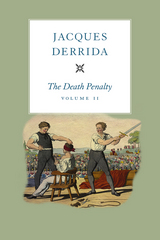
Of central importance in this second volume is Kant’s explicit justification of the death penalty in the Metaphysics of Morals. Thoroughly deconstructing Kant’s position—which holds the death penalty as exemplary of the eye-for-an-eye Talionic law—Derrida exposes numerous damning contradictions and exceptions. Keeping the current death penalty in the United States in view, he further explores the “anesthesial logic” he analyzed in volume one, addressing the themes of cruelty and pain through texts by Robespierre and Freud, reading Heidegger, and—in a fascinating, improvised final session—the nineteenth-century Spanish Catholic thinker Donoso Cortés. Ultimately, Derrida shows that the rationality of the death penalty as represented by Kant involves an imposition of knowledge and calculability on a fundamental condition of non-knowledge—that we don’t otherwise know what or when our deaths will be. In this way, the death penalty acts out a phantasm of mastery over one’s own death.
Derrida’s thoughts arrive at a particular moment in history: when the death penalty in the United States is the closest it has ever been to abolition, and yet when the arguments on all sides are as confused as ever. His powerful analysis will prove to be a paramount contribution to this debate as well as a lasting entry in his celebrated oeuvre.
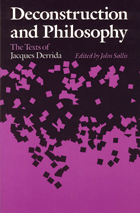
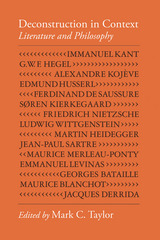
"This invaluable philosophical sampler brings together many of the threads out of which deconstruction is woven. taylor's anthology does not make deconstruction easy; much more usefully, it provides a meticulous guide to the sources – and significance – of the difficulties. – Barbara E. Johnson
"The book will be of great value as a set of readings with authoritative explanation for all those interested in the current relations of literature and philosophy. It is the best book of its kind I know. – J. Hillis Miller, Yale University
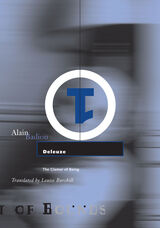

Originally published as a special issue of South Atlantic Quarterly (Summer 1997), this volume includes essays from some of the most prominent American, Australian, British, and French scholars and translators of Deleuze’s writing. These essays, ranging from film, television, art, and literature to philosophy, psychoanalysis, geology, and cultural studies, reflect the broad interests of Deleuze himself. Providing both an introduction and critique of Deleuze, this volume will engage those readers interested in literary and cultural theory, philosophy, and the future of those areas of study in which Deleuze worked.
Contributors. Ronald Bogue, Ian Buchanan, André Pierre Colombat, Tom Conley, Manuel DeLanda, Tessa Dwyer, Jerry Aline Flieger, Eugene Holland, Fredric Jameson, Jean-Clet Martin, John Mullarkey, D. N. Rodowick, Horst Ruthrof, Charles J. Stivale
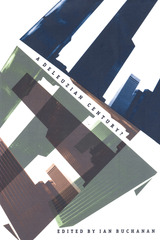
To show us how Deleuze’s philosophy works, Buchanan begins with Melville’s notion that “a great book is always the inverse of another book that could only be written in the soul, with silence and blood.” Buchanan demonstrates that the figure of two books—one written in ink and the other written in blood—lies at the center of Deleuze’s hermeneutics and that a special relation must be established in order to read the second book from the first. This relation is Deleuzism. By explicating elemental concepts in Deleuze—desire, flow, the nomad—Buchanan finds that, despite Deleuze’s self-declared moratorium on dialectics, he was in several important respects a dialectician. In essays that address the “prehistory” of Deleuze’s philosophy, his methodology, and the utopic dimensions of his thought, Buchanan extracts an apparatus of social critique that arises from the philosopher’s utopian impulse.
Deleuzism is a work that will engage all those with an interest in the twentieth-century’s most original philosopher.
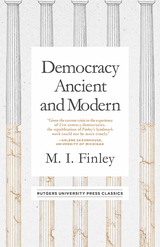
This classic study of democratic principles is thus now more relevant than ever. A renowned historian of antiquity and political philosophy, Sir M.I. Finley offers a comparative analysis of Greek and modern conceptions of democracy. As he puts the ancient Greeks in dialogue with their contemporary counterparts, Finley tackles some of the most pressing issues of our day, including public apathy, partisanship, consensus politics, distrust of professional politicians, and the limits of free speech.
Including three lectures that Finley delivered at Rutgers University, plus two additional essays that further illuminate his thinking, Democracy Ancient and Modern explores the dramatic differences between the close-knit civil society of the ancient Greeks and our own atomized mass societies. By mapping out democracy’s past and its present manifestations, this book helps us plot a course for democracy’s future.
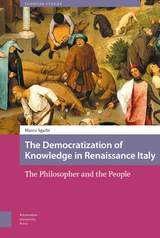
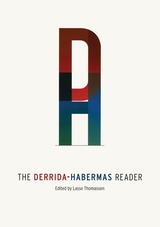
Jacques Derrida and Jürgen Habermas have long represented opposite camps in contemporary thought. Derrida, who pioneered the intellectual style of inquiry known as deconstruction, ushered in the postmodern age with his dramatic critique of reason; Habermas, on the other hand, has consistently argued in defense of reason, modernity, and the legacy of the Enlightenment. Their many differences led to a long-standing, if scattered, dialogue, evidence of which has been available in only bits and pieces. But now, for the first time, TheDerrida-Habermas Reader brings these pieces together, along with a collection of essays documenting the intellectual relationship between two of the twentieth century’s preeminent thinkers.
Taken together, Derrida and Habermas’s writings—combined here with contributions by other prominent philosophers and social theorists—tell the story of the two thinkers’ provocative engagement with each other’s ideas. Beyond exploring the conflict between Derrida’s deconstruction and Habermas’s communicative rationality, they show how the Derrida-Habermas encounter changed over the years, becoming more theoretically productive without ever collapsing into mutual rejection or simple compromise.
Lasse Thomassen has divided the essays—including works on philosophy and literature, ethics, politics, and international law—into four parts that cover the full range of thought in which Derrida and Habermas engaged. The last of these sections fittingly includes the thinkers’ jointly signed work on European solidarity and the Iraq War, highlighting the hopes they held in common despite their differences. The wide breadth of this book, along with Thomassen’s lucid introductions to each section, makes The Derrida-Habermas Reader an ideal starting point for anyone interested in one of the most dynamic intellectual debates of our time.

Descartes and his Contemporaries recreates the tumultuous intellectual community of seventeenth-century Europe and provides a detailed, modern analysis of the Meditations in its historical context. The book's chapters examine the arguments and positions of each of the objectors—Hobbes, Gassendi, Arnauld, Morin, Caterus, Bourdin, and others whose views were compiled by Mersenne. They illuminate Descartes' relationships to the scholastics and particularly the Jesuits, to Mersenne's circle with its debates about the natural sciences, to the Epicurean movements of his day, and to the Augustinian tradition. Providing a glimpse of the interactions among leading 17th-century intellectuals as they grappled with major philosophical issues, this book sheds light on how Descartes' thought developed and was articulated in opposition to the ideas of his contemporaries.
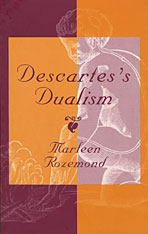
Descartes, an acknowledged founder of modern philosophy, is identified particularly with mind-body dualism--the view that the mind is an incorporeal entity. But this view was not entirely original with Descartes, and in fact to a significant extent it was widely accepted by the Aristotelian scholastics who preceded him, although they entertained a different conception of the nature of mind, body, and the relationship between them. In her first book, Marleen Rozemond explicates Descartes's aim to provide a metaphysics that would accommodate mechanistic science and supplant scholasticism.
Her approach includes discussion of central differences from and similarities to the scholastics and how these discriminations affected Descartes's defense of the incorporeity of the mind and the mechanistic conception of body. Confronting the question of how, in his view, mind and body are united, she examines his defense of this union on the basis of sensation. In the course of her argument, she focuses on a few of the scholastics to whom Descartes referred in his own writings: Thomas Aquinas, Francisco Suárez, Eustachius of St. Paul, and the Jesuits of Coimbra. This new systematic account of Descartes's dualism amply demonstrates why he still deserves serious study and respect for his extraordinary philosophical achievements.
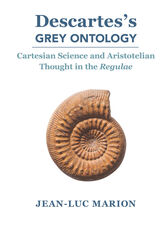
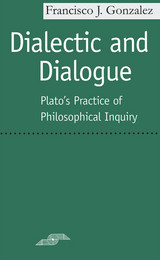
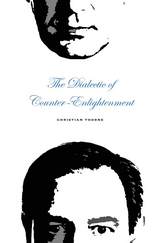
In this wide-ranging, ambitious, and engaging study, Christian Thorne confronts the history and enduring legacy of anti-foundationalist thought.
Anti-foundationalism—the skeptical line of thought that contends our beliefs cannot be authoritatively grounded and that most of what passes for knowledge is a sham—has become one of the dominant positions in contemporary criticism. Thorne argues that despite its ascendance, anti-foundationalism is wrong. In The Dialectic of Counter-Enlightenment, he uses deft readings of a range of texts to offer new perspectives on the ongoing clash between philosophy and comprehensive doubt.
The problem with anti-foundationalism is not, as is often thought, that it radiates uncertainty or will unglue the university, but instead that it is a system of thought—with set habits that generate unearned certainties. The shelves are full of histories of modern philosophy, but the history of the resistance to philosophical thought remains to be told. At its heart, The Dialectic of Counter-Enlightenment is a plea not to take doubt at its word—a plea for the return of a vanished philosophical intelligence and for the retirement of an anti-Enlightenment thinking that commits, over and over again, the very crimes that it lays at Enlightenment’s door.
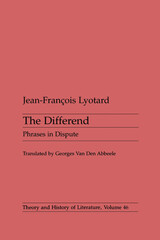
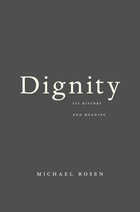
Dignity plays a central role in current thinking about law and human rights, but there is sharp disagreement about its meaning. Combining conceptual precision with a broad historical background, Michael Rosen puts these controversies in context and offers a novel, constructive proposal.
“Penetrating and sprightly…Rosen rightly emphasizes the centrality of Catholicism in the modern history of human dignity. His command of the history is impressive…Rosen is a wonderful guide to the recent German constitutional thinking about human dignity…[Rosen] is in general an urbane and witty companion, achieving his aim of accessibly written philosophy.”
—Samuel Moyn, The Nation
“[An] elegant, interesting and lucid exploration of the concept of dignity...Drawing on classical, liberal and Catholic traditions, Rosen hopes to rehabilitate dignity to its rightful place near the centre of moral thought...Rosen's admirable book deserves wide attention from political theorists, jurisprudes and political philosophers.”
—Simon Blackburn, Times Higher Education
“Dignity deserves to be widely read, not only for its intrinsic interest, but also as a corrective to the habit of discussing such topics in abstraction from their social context. Whether or not one agrees with Rosen's arguments, there can be no doubt he has widened our horizons.”
—Rae Langton, Times Literary Supplement

The man with the golden mouth.
Dio Cocceianus Chrysostomus (AD ca. 40–ca. 120), of Prusa in Bithynia, Asia Minor, inherited with his brothers large properties and debts from his generous father Pasicrates. He became a skilled rhetorician hostile to philosophers. But in the course of his travels he went to Rome in Vespasian’s reign (69–79) and was converted to Stoicism. Strongly critical of the emperor Domitian (81–96) he was about 82 banned by him from Italy and Bithynia and wandered in poverty, especially in lands north of the Aegean, as far as the Danube and the primitive Getae. In 97 he spoke publicly to Greeks assembled at Olympia, was welcomed at Rome by emperor Nerva (96–98), and returned to Prusa. Arriving again at Rome on an embassy of thanks about 98–99 he became a firm friend of emperor Trajan. In 102 he traveled to Alexandria and elsewhere. Involved in a lawsuit about plans to beautify Prusa at his own expense, he stated his case before the governor of Bithynia, Pliny the Younger, 111–112. The rest of his life is unknown.
Nearly all of Dio’s extant Discourses (or Orations) reflect political concerns (the most important of them dealing with affairs in Bithynia and affording valuable details about conditions in Asia Minor) or moral questions (mostly written in later life; they contain much of his best writing). Some philosophical and historical works, including one on the Getae, are lost. What survives of his achievement as a whole makes him prominent in the revival of Greek literature in the last part of the first century and the first part of the second.
The Loeb Classical Library edition of Dio Chrysostom is in five volumes.

The man with the golden mouth.
Dio Cocceianus Chrysostomus (AD ca. 40–ca. 120), of Prusa in Bithynia, Asia Minor, inherited with his brothers large properties and debts from his generous father Pasicrates. He became a skilled rhetorician hostile to philosophers. But in the course of his travels he went to Rome in Vespasian’s reign (69–79) and was converted to Stoicism. Strongly critical of the emperor Domitian (81–96) he was about 82 banned by him from Italy and Bithynia and wandered in poverty, especially in lands north of the Aegean, as far as the Danube and the primitive Getae. In 97 he spoke publicly to Greeks assembled at Olympia, was welcomed at Rome by emperor Nerva (96–98), and returned to Prusa. Arriving again at Rome on an embassy of thanks about 98–99 he became a firm friend of emperor Trajan. In 102 he traveled to Alexandria and elsewhere. Involved in a lawsuit about plans to beautify Prusa at his own expense, he stated his case before the governor of Bithynia, Pliny the Younger, 111–112. The rest of his life is unknown.
Nearly all of Dio’s extant Discourses (or Orations) reflect political concerns (the most important of them dealing with affairs in Bithynia and affording valuable details about conditions in Asia Minor) or moral questions (mostly written in later life; they contain much of his best writing). Some philosophical and historical works, including one on the Getae, are lost. What survives of his achievement as a whole makes him prominent in the revival of Greek literature in the last part of the first century and the first part of the second.
The Loeb Classical Library edition of Dio Chrysostom is in five volumes.

The man with the golden mouth.
Dio Cocceianus Chrysostomus (AD ca. 40–ca. 120), of Prusa in Bithynia, Asia Minor, inherited with his brothers large properties and debts from his generous father Pasicrates. He became a skilled rhetorician hostile to philosophers. But in the course of his travels he went to Rome in Vespasian’s reign (69–79) and was converted to Stoicism. Strongly critical of the emperor Domitian (81–96) he was about 82 banned by him from Italy and Bithynia and wandered in poverty, especially in lands north of the Aegean, as far as the Danube and the primitive Getae. In 97 he spoke publicly to Greeks assembled at Olympia, was welcomed at Rome by emperor Nerva (96–98), and returned to Prusa. Arriving again at Rome on an embassy of thanks about 98–99 he became a firm friend of emperor Trajan. In 102 he traveled to Alexandria and elsewhere. Involved in a lawsuit about plans to beautify Prusa at his own expense, he stated his case before the governor of Bithynia, Pliny the Younger, 111–112. The rest of his life is unknown.
Nearly all of Dio’s extant Discourses (or Orations) reflect political concerns (the most important of them dealing with affairs in Bithynia and affording valuable details about conditions in Asia Minor) or moral questions (mostly written in later life; they contain much of his best writing). Some philosophical and historical works, including one on the Getae, are lost. What survives of his achievement as a whole makes him prominent in the revival of Greek literature in the last part of the first century and the first part of the second.
The Loeb Classical Library edition of Dio Chrysostom is in five volumes.

The man with the golden mouth.
Dio Cocceianus Chrysostomus (AD ca. 40–ca. 120), of Prusa in Bithynia, Asia Minor, inherited with his brothers large properties and debts from his generous father Pasicrates. He became a skilled rhetorician hostile to philosophers. But in the course of his travels he went to Rome in Vespasian’s reign (69–79) and was converted to Stoicism. Strongly critical of the emperor Domitian (81–96) he was about 82 banned by him from Italy and Bithynia and wandered in poverty, especially in lands north of the Aegean, as far as the Danube and the primitive Getae. In 97 he spoke publicly to Greeks assembled at Olympia, was welcomed at Rome by emperor Nerva (96–98), and returned to Prusa. Arriving again at Rome on an embassy of thanks about 98–99 he became a firm friend of emperor Trajan. In 102 he traveled to Alexandria and elsewhere. Involved in a lawsuit about plans to beautify Prusa at his own expense, he stated his case before the governor of Bithynia, Pliny the Younger, 111–112. The rest of his life is unknown.
Nearly all of Dio’s extant Discourses (or Orations) reflect political concerns (the most important of them dealing with affairs in Bithynia and affording valuable details about conditions in Asia Minor) or moral questions (mostly written in later life; they contain much of his best writing). Some philosophical and historical works, including one on the Getae, are lost. What survives of his achievement as a whole makes him prominent in the revival of Greek literature in the last part of the first century and the first part of the second.
The Loeb Classical Library edition of Dio Chrysostom is in five volumes.

The man with the golden mouth.
Dio Cocceianus Chrysostomus (AD ca. 40–ca. 120), of Prusa in Bithynia, Asia Minor, inherited with his brothers large properties and debts from his generous father Pasicrates. He became a skilled rhetorician hostile to philosophers. But in the course of his travels he went to Rome in Vespasian’s reign (69–79) and was converted to Stoicism. Strongly critical of the emperor Domitian (81–96) he was about 82 banned by him from Italy and Bithynia and wandered in poverty, especially in lands north of the Aegean, as far as the Danube and the primitive Getae. In 97 he spoke publicly to Greeks assembled at Olympia, was welcomed at Rome by emperor Nerva (96–98), and returned to Prusa. Arriving again at Rome on an embassy of thanks about 98–99 he became a firm friend of emperor Trajan. In 102 he traveled to Alexandria and elsewhere. Involved in a lawsuit about plans to beautify Prusa at his own expense, he stated his case before the governor of Bithynia, Pliny the Younger, 111–112. The rest of his life is unknown.
Nearly all of Dio’s extant Discourses (or Orations) reflect political concerns (the most important of them dealing with affairs in Bithynia and affording valuable details about conditions in Asia Minor) or moral questions (mostly written in later life; they contain much of his best writing). Some philosophical and historical works, including one on the Getae, are lost. What survives of his achievement as a whole makes him prominent in the revival of Greek literature in the last part of the first century and the first part of the second.
The Loeb Classical Library edition of Dio Chrysostom is in five volumes.

From slave to sage.
Epictetus was a crippled Greek slave of Phrygia during Nero’s reign (AD 54–68) who heard lectures by the Stoic Musonius before he was freed. Expelled with other philosophers by the emperor Domitian in 89 or 92, he settled permanently in Nicopolis in Epirus. There, in a school that he called “healing place for sick souls” he taught a practical philosophy, details of which were recorded by Arrian, a student of his, and survive in four books of Discourses and a smaller Encheiridion, a handbook that gives briefly the chief doctrines of the Discourses. He apparently lived into the reign of Hadrian (AD 117–138).
Epictetus was a teacher of Stoic ethics, broad and firm in method, sublime in thought, and now humorous, now sad or severe in spirit. How should one live righteously? Our god-given will is our paramount possession, and we must not covet others’. We must not resist fortune. Man is part of a system; humans are reasoning beings (in feeble bodies) and must conform to god’s mind and the will of nature. Epictetus presents us also with a pungent picture of the perfect (Stoic) man.
The Loeb Classical Library edition of Epictetus is in two volumes.

From slave to sage.
Epictetus was a crippled Greek slave of Phrygia during Nero’s reign (AD 54–68) who heard lectures by the Stoic Musonius before he was freed. Expelled with other philosophers by the emperor Domitian in 89 or 92, he settled permanently in Nicopolis in Epirus. There, in a school that he called “healing place for sick souls” he taught a practical philosophy, details of which were recorded by Arrian, a student of his, and survive in four books of Discourses and a smaller Encheiridion, a handbook that gives briefly the chief doctrines of the Discourses. He apparently lived into the reign of Hadrian (AD 117–138).
Epictetus was a teacher of Stoic ethics, broad and firm in method, sublime in thought, and now humorous, now sad or severe in spirit. How should one live righteously? Our god-given will is our paramount possession, and we must not covet others’. We must not resist fortune. Man is part of a system; humans are reasoning beings (in feeble bodies) and must conform to god’s mind and the will of nature. Epictetus presents us also with a pungent picture of the perfect (Stoic) man.
The Loeb Classical Library edition of Epictetus is in two volumes.
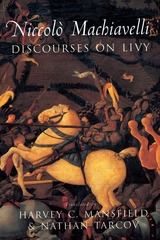
"[Machiavelli] found in Livy the means to inspire scholars for five centuries. Within the Discourses, often hidden and sometimes unintended by their author, lie the seeds of modern political thought. . . . [Mansfield and Tarcov's] translation is careful and idiomatic."—Peter Stothard, The Times
"Translated with painstaking accuracy—but also great readability."—Weekly Standard
"A model of contemporary scholarship and a brave effort at Machiavelli translation that allows the great Florentine to speak in his own voice."—Choice
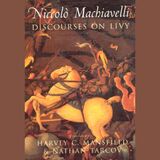
"[Machiavelli] found in Livy the means to inspire scholars for five centuries. Within the Discourses, often hidden and sometimes unintended by their author, lie the seeds of modern political thought. . . . [Mansfield and Tarcov's] translation is careful and idiomatic."—Peter Stothard, The Times
"Translated with painstaking accuracy—but also great readability."—Weekly Standard
"A model of contemporary scholarship and a brave effort at Machiavelli translation that allows the great Florentine to speak in his own voice."—Choice
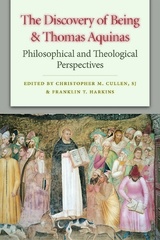
The collection of essays within The Discovery of Being and Thomas Aquinas is divided into three major parts: the first set of essays concerns the foundation of metaphysics within Thomism; the second set exemplifies the use of metaphysics in fundamental philosophical issues within Thomism; and the third set employs metaphysics in central theological issues.
The Discovery of Being and Thomas Aquinas allows major scholars of the different types of Thomism to engage in a full-scale defense of their position, as well as expanding Thomistic metaphysics to the discipline of theology in important ways.
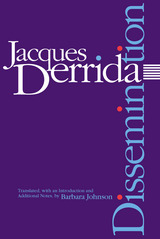
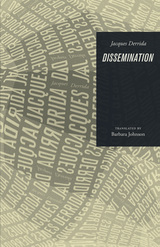
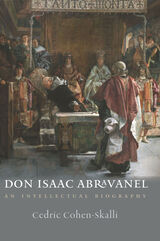
Don Isaac Abravanel (1437–1508) was one of the great inventors of Jewish modernity. A merchant, banker, and court financier, a scholar versed in both Jewish and Christian writings, a preacher and exegete, a prominent political actor in royal entourages and Jewish communities, Abravanel was one of the greatest leaders and thinkers of Iberian Jewry in the aftermath of the expulsion of 1492. This book, the first new intellectual biography of Abravanel in twenty years, depicts his life in three cultural milieus—Portugal, Castile, and post-expulsion Italy—and analyzes his major literary accomplishments in each period. Abravanel was a traditionalist with innovative ideas, a man with one foot in the Middle Ages and the other in the Renaissance. An erudite scholar, author of a monumental exegetical opus that is still studied today, and an avid book collector, he was a transitional figure, defined by an age of contradictions. Yet, it is these very contradictions that make him such an important personality for understanding the dawn of Jewish modernity.
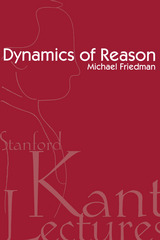
Through a modified Kantian approach to epistemology and philosophy of science, this book opposes both Quinean naturalistic holism and the post-Kuhnian conceptual relativism that has dominated recent literature in science studies. Focussing on the development of "scientific philosophy" from Kant to Rudolf Carnap, along with the parallel developments taking place in the sciences during the same period, the author articulates a new dynamical conception of relativized a priori principles. This idea applied within the physical sciences aims to show that rational intersubjective consensus is intricately preserved across radical scientific revolutions or "paradigm-shifts and how this is achieved.
READERS
Browse our collection.
PUBLISHERS
See BiblioVault's publisher services.
STUDENT SERVICES
Files for college accessibility offices.
UChicago Accessibility Resources
home | accessibility | search | about | contact us
BiblioVault ® 2001 - 2024
The University of Chicago Press









